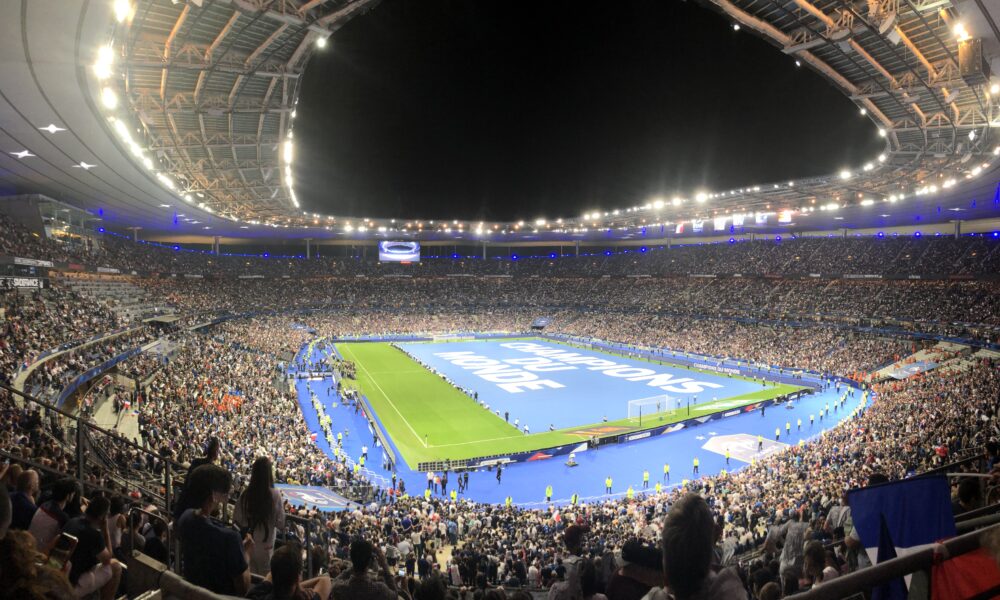On March 18, the men’s football international break began and hundreds of footballers joined their senior and youth national teams for international friendlies to prepare for the Copa America and European championships this summer. Wearing the badge, if only once, is their ultimate aspiration. Most can only dream of standing under those lights, hand on their heart, ready to play with the hopes of millions of their compatriots on their backs. Yet for some, this dream is more loaded than for others. Muslim French players have been told that it does not matter if they are good enough: To represent their country, they must repress their personal and spiritual beliefs.
Three days after the beginning of the international break, the French Football Federation (FFF) announced they would not permit any players associated with the French national training centre, Clairefontaine, to fast, instead directing them to make up the days after Ramadan. The decision forced Mahamadou Diawara to leave the under-19 French national squad so that he could continue his fast. This comes only one week after the FFF refused to allow evening matches in France to be paused for players to break their fast upon the arrival of Iftaar at sundown. This contrasts the approach taken by professional leagues in England, Germany, and the Netherlands, where games may be paused for a few minutes at Iftaar for players to drink water and eat. Considered the most important month in the Islamic calendar, Ramadan is of tremendous spiritual importance to Muslim communities all over the world, including some of the world’s best footballers such as Mo Salah, Granit Xhaka, and İlkay Gündoğan.
Muslim footballers such as Zinedine Zidane, Frank Ribéry, and N’Golo Kanté have formed the core of the French national team for the last thirty years, a period in which France has won two World Cups and been runner-up in two more. However, the racial and religious composition of //les Bleus// has never been more contentious. In the wake of a message the player wrote on Twitter sending prayers to Gaza in October, French international and former Real Madrid star Karim Benzema was falsely accused of having links to the Muslim Brotherhood by Interior Minister Gérald Darmanin.
It is not just men’s professional footballers who are victims of these policies. Women athletes were banned from wearing a headscarf in France, a rule which has been relaxed temporarily for non-French internationals at the Olympics in Paris this summer, but will nonetheless be reinstated immediately afterward. This comes in the wake of the infamous burkini ban in many French jurisdictions in 2016 which led to Muslim women being excluded from public spaces including pools and beaches.
The French sporting authority’s purposeful misinterpretation of the principle of //laïcité//, which maintains the separation between church and state, is cited as justification for the overt discrimination against Muslim athletes. Yet there is no reference to the fact it is the state, not private citizens, which are beholden to this. It would be ludicrous to expect any typical private citizen to change their spiritual beliefs upon entering their workplace. Why does the FFF expect players to give up their religion upon entering the playing field?
Muslims make up a significant proportion of the French population, and have been the victim of political attacks by members of the resurgent far right for over a decade. The irony of France—a country that colonized, repressed, and exploited huge swathes of the Muslim world—now repressing its own Muslim citizens, is lost on none. For Muslim French athletes, playing for the tricolour is weighted with contradiction and hazard.
France is one of the global talent centres for football and is home to some of the best men’s and women’s professional football leagues in the world. France’s sporting authorities owe a safe space to their youth and senior athletes to engage in their spiritual beliefs. The FFF must have the courage to stand up for their athletes instead of pandering to the fancies of Islamophobic politicians who refuse to accept the diverse reality of modern France. Muslims who play sports are not refusing to assimilate to France: They are participating in one of the most important nation-building components of public life, and helping expand the meaning of French citizenship.









